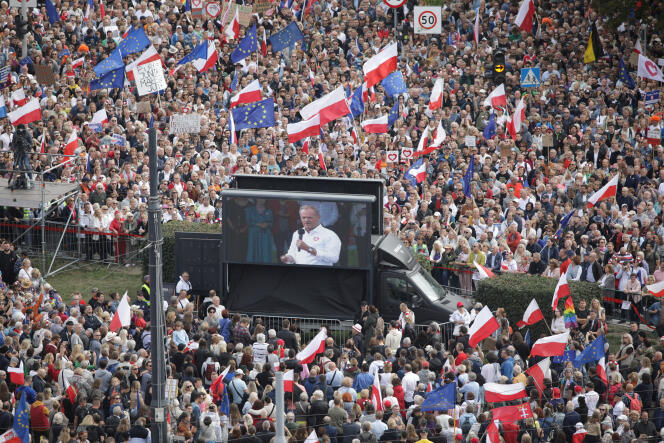


"This is not just the biggest political mobilization in Poland's political history. It is without doubt the biggest political rally in the world today," boasted Donald Tusk at the head of a gigantic white and red rally in Warsaw on Sunday, October 1. According to the mayor's office in the Polish capital, headed by Rafal Trzaskowski, a close friend and member of the Civic Platform (PO), almost a million people marched in the afternoon, while the online news site Onet estimated between 600,000 and 800,000 participants.
Former Polish prime minister Donald Tusk (2007-2014), at the head of a coalition credited with around 28% in the October 15 parliamentary elections and led by his PO party, is hoping that this tour de force will boost him in the polls. This hope is growing, given that the turnout surpassed the previous event on June 4, when 500,000 people gathered in the capital, giving the coalition 30% of voting intentions.
However, overtaking the conservative Law and Justice (PiS) party seems a tall order. Jaroslaw Kaczynski's party, in power since 2015, leads the race with 36% of the vote according to polling projections. The challenge for the center-right coalition is therefore to avoid taking votes away from the two electoral alliances that are essential if it hopes to govern: New Left and Third Way, both at around 9%. Except Third Way continues to be dangerously close to the 8% threshold required for coalitions to enter the Sejm, the lower house of the Polish parliament. This would mean an almost certain victory for the PiS.
On Sunday, hundreds of thousands of people lining Warsaw's main thoroughfares were demonstrating for political change on October 15. "When Tusk was in power, we had the rule of law, and Poles weren't pitted against each other," stressed Krystyna, a 65-year-old pensioner from Radom, 100 km south of Warsaw. A chemist by training and with a heart stuck to her cheek, she came in a bus chartered by Tusk's party. She assured us that there were even more participants than four months ago. "I've known communism, but I've never seen such hateful language as that used by the PiS," said Krystyna, who fears an exit from the European Union if the democratic opposition does not win.
Justyna, an architect in her 30s who came with her family, didn't expect a "Polexit" – "the PiS is too dependent on European subsidies" – but she could well leave Poland if the conservative nationalists win. "Eight years under their rule has been hard on me as a woman. I'd like to have a child, but in Poland, you can now die from it," said Justyna, referring to the seven women who have died in the last two years, denied an abortion as the procedure is no longer legal in cases of fetal malformation.
You have 26.83% of this article left to read. The rest is for subscribers only.
